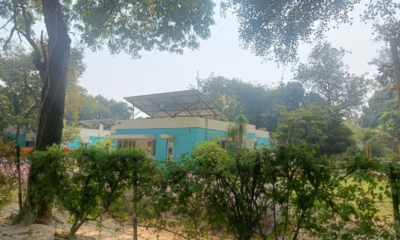EDUNEWS & VIEWS
Tata’s indelible legacy in science and education
Beyond business, Ratan Tata, the ex-leader of India’s massive business empire, believed in the true power of science and education

Ratan Tata, India’s most admired industrialist who passed away on October 9, 2024, has left behind an indelible legacy that extends well beyond the business sector, profoundly influencing education and scientific advancement in India. His visionary outlook emphasized the transformative potential of knowledge, reinforcing his belief that education is essential for societal growth.
Throughout his life, Tata, the man who built a business empire with revenue of $165 billion, was deeply committed to empowering future generations. Through Tata Trusts, he championed philanthropic initiatives aimed at supporting students from economically disadvantaged backgrounds, offering scholarships that allow them to pursue higher education both domestically and internationally. This commitment reflects his conviction that education should be accessible to all, serving as a vital pathway to opportunity.
Among his significant contributions is the establishment of Tata Scholarships at prestigious institutions such as Cornell University, which facilitate access to top-tier education for deserving Indian students. Tata’s vision also led to the founding of key educational institutions within India, including the Tata Institute of Social Sciences (TISS) and the Tata Institute of Fundamental Research (TIFR). These institutions play a crucial role in nurturing talent and fostering innovative thinking.
In 2014, Tata Trusts, which controls majority stake in Tata Sons, made a significant contribution of $9 million to the Centre for Neuroscience at IISc, aimed at advancing vital research into Alzheimer’s disease.
Under his guidance, the Tata Group greatly increased its investment in research and development, laying the groundwork for India’s rise as a global technology leader. Tata’s focus on innovation not only addressed market demands but also created a foundation for trailblazing advancements that have the potential to transform industries.
One of Tata’s most impactful legacies in science is his unwavering support for leading educational and research institutions. The Indian Institute of Science (IISc) in Bengaluru, which has roots in Jamshedji Tata’s vision, continued to thrive under Ratan Tata’s leadership. A government agency recently ranked IISc as India’s top university.
In 2014, Tata Trusts, which controls majority stake in Tata Sons, made a significant contribution of $9 million to the Centre for Neuroscience at IISc, aimed at advancing vital research into Alzheimer’s disease. This initiative shows his belief in the importance of scientific inquiry and its potential to tackle pressing societal challenges.
In the fields of genetics and biotechnology, Tata’s foresight led to the creation of the Tata Institute for Genetics and Society at the University of California, San Diego
Tata’s dedication to advancing scientific research is further highlighted by the establishment of specialized centres addressing societal needs. The Tata Centre for Technology and Design at IIT Bombay and the MIT Tata Centre of Technology and Design were created to develop engineering solutions for resource-limited communities. These initiatives not only stimulate innovation but also connect academic research with practical applications, ensuring that scientific progress serves society.
In the fields of genetics and biotechnology, Tata’s foresight led to the creation of the Tata Institute for Genetics and Society at the University of California, San Diego, with a substantial $70 million donation. This institute conducts cutting-edge research in genetics, gene editing, and stem cell therapy, placing India at the forefront of global genetic studies.
Tata’s commitment to environmental sustainability is reflected in his support for research at the University of New South Wales Faculty of Engineering, focusing on developing water purification technologies for underserved regions. This dedication highlights his belief in the capacity of science to create sustainable solutions for pressing global challenges.
As India reflects on the loss of this influential leader, Ratan Tata’s enduring legacy in education and science serves as a powerful reminder of his vision. His initiatives have positively impacted around 3.6 million students and teachers across 26 states and 145 districts in India, helping to shape a future where knowledge and innovation drive societal advancement. Ratan Tata’s life and work inspire us to recognize that true success is measured not just by business achievements, but by the positive change we bring to the world through education and research.
Tata’s Education
Ratan Tata’s educational journey began at Campion School in Mumbai, India’s financial capital, where he studied until the 8th grade. He then attended several prestigious institutions, including Cathedral and John Connon School in Mumbai, Bishop Cotton School in Shimla, and Riverdale Country School in New York City, from which he graduated in 1955. Following high school, he pursued higher education at Cornell University, earning a bachelor’s degree in architecture in 1959.
During his time at Cornell, Tata joined the Alpha Sigma Phi Fraternity. In recognition of his commitment to education, he made a historic contribution of $50 million to the university in 2008, marking him as the largest international donor in its history. Additionally, Tata furthered his studies by completing the Advanced Management Program at Harvard Business School in 1975.
EDUNEWS & VIEWS
Global Highschool Rankings 2025: UK and US Dominate, China Rises
Among the standout institutions, Westminster School maintained its dominance with over 40% of graduates entering Oxbridge

In a global assessment of elite high schools, the HSBC Hurun Education Global High Schools 2025 report has named Westminster School in London as the world’s best high school for the third consecutive year. The annual ranking, now in its third edition, evaluates the top 180 independent schools across 11 countries based on university placements, co-curricular development, and institutional reputation.
The list reflects a shifting but still concentrated landscape of educational excellence. The United States and the United Kingdom together accounted for 85% of the world’s top highschools, with the US leading at 45% and the UK at 40%. However, China emerged as a strong contender, ranking third with 16 schools—up from 13 last year.
“The number of Chinese students studying abroad fell last year, but there are still nearly one million,” said Rupert Hoogewerf, Chairman and Chief Researcher of Hurun Education. “Interestingly, with 16 top-ranked highschools, Chinese families are finding viable options closer to home—avoiding time zone issues and maintaining cultural continuity.”
Among the standout institutions, Westminster School maintained its dominance with over 40% of graduates entering Oxbridge. St Paul’s School rose to second place, while The Dalton School in New York dropped to third. Notably, Winchester College returned to the top 10 and was named the world’s best boarding school, surpassing even Eton College and Phillips Andover.
“These rankings offer forward-looking insights for families planning their children’s international education,” said Kai Zhang, Head of International Wealth and Premier Banking, HSBC Asia, in a media statement. “Destinations like Hong Kong and Singapore are becoming increasingly attractive for their proximity and cultural alignment with Asian families.”
The report also revealed evolving trends in school environments and demographics:
>> 70% of the schools are co-educational, with a growing shift among historically boys-only UK schools admitting girls.
>> 51% offer boarding options, while half remain day schools.
>> The average school size was 1,050 students, with 140 graduating each year.
>> The average age of these schools is 204 years, with some—like King’s School, Canterbury—tracing roots back over a millennium.
Meanwhile, India’s Dhirubhai Ambani International School in Mumbai ranked 5th among schools outside the US and UK, continuing its position as a global outlier in quality private education from the subcontinent.
Despite steep tuition fees—averaging $63,000 annually for boarding schools—demand for places remains high. However, the UK’s recent addition of VAT on private school fees has prompted concerns, with schools like Winchester now costing over $80,000 per year.
Another key theme this year is the integration of creative thinking and AI literacy in education. “There is a real push toward STEAM, adding ‘Arts’ to STEM. Schools are under pressure to future-proof education and prepare students to thrive in the 2050s,” Hoogewerf added.
With data drawn from university destinations, co-curricular achievements, and alumni impact, the HSBC Hurun rankings offer more than a leaderboard—they reflect the evolving priorities and challenges in elite education worldwide.
EDUNEWS & VIEWS
Ambani Donates $18 Million to the Institute of Chemical Technology
Mukesh Ambani, who had chosen to study at ICT over IIT Bombay credited his professor with shaping his professional journey and inspiring the principles that led to Reliance’s growth

Mukesh Ambani, the country’s richest man, had announced a mammoth donation of $18 million to his alma mater, Mumbai’s Institute of Chemical Technology (ICT), on June 6.
Ambani, who is chairman and managing director at Reliance Industries, had been in attendance at a book launch event for Divine Scientist, a biography on Prof. Man Mohan Sharma, Ambani’s ex-teacher and cherished mentor.
Addressing a packed audience at ICT, Ambani said he was invested in ICT’s long-term growth and success in all fronts; advancing research, education, and ideals that Prof. Singh stood for, that is knowledge, sustainability, and nation-building. Sharma, who is professor in chemical engineering at ICT, had been the first engineer from India to be elected as a fellow of the Britain’s prestigious Royal Society.
“This is my Guru Dakshina (offering) [to Prof. Sharma],” Ambani said. Prof. Sharma has had a considerable influence upon him in shaping his professional journey, as well as principles, that led to Reliance’s growth.
In an anecdote he shared with the public, he said, “Prof. Sharma told me, ‘Mukesh, you have to do something big for ICT.’ I replied, ‘Sir, just tell me what to do.’ And he said, ‘Announce $18 million to ICT unconditionally.’ I’m very, very pleased to do that today.”
In the 1970s, Ambani was student at ICT, then known as the University Department of Chemical Technology (or UDCT). He had chosen ICT over an admissions offer at the prestigious Indian Institute of Technology, Bombay.
EDUNEWS & VIEWS
Harvard Pledges $250 Million for Research After Federal Funding Slash
The administration has defended the funding freeze as part of a broader campaign to address what it characterizes as pervasive anti-Semitism on campuses and to roll back diversity programs

Harvard University has announced a $250 million investment to sustain vital research programs in the face of steep federal funding cuts imposed by the Trump administration.
The move follows a sweeping $2.6 billion reduction in government grants to the Ivy League institution, citing alleged discriminatory practices and refusal to comply with federal oversight mandates. The cuts, which Harvard is actively challenging in court, have already suspended or canceled dozens of projects—some of which were considered critical to public health and technological innovation.
University President Alan Garber and Provost John Manning issued a joint statement on Wednesday, emphasizing the urgent need to protect research initiatives. “While we cannot fully offset the financial blow from halted federal support, we are committed to backing essential research during this transitional period,” they said. The university is also working with faculty to secure alternative funding channels.
Harvard has strongly criticized the federal measures, calling the termination of grants “unlawful” and accusing the administration of interfering with academic independence. The university contends that the loss of funding not only halts groundbreaking work but also threatens years of scientific progress.
At the heart of the dispute is a broader political clash over university governance. Harvard, whose endowment reached $53.2 billion in 2024, has become a focal point of the Trump administration’s efforts to reshape higher education policy. The White House has demanded greater control over admissions, hiring, and the political climate on campus—demands Harvard has resisted.
The administration has defended the funding freeze as part of a broader campaign to address what it characterizes as pervasive anti-Semitism on campuses and to roll back diversity programs. Critics argue these moves are part of a larger effort to suppress progressive academic culture and penalize dissent over U.S. foreign policy, especially in light of recent student protests against the war in Gaza.
In recent weeks, federal authorities have also taken steps to revoke visas of international students involved in these demonstrations, accusing them of ties to militant organizations—allegations civil rights groups and university leaders have strongly disputed.
With tensions between the federal government and top academic institutions mounting, Harvard’s legal challenge could set a precedent for how universities navigate political interference while safeguarding research, free speech, and academic autonomy.
-

 Society4 months ago
Society4 months agoStarliner crew challenge rhetoric, says they were never “stranded”
-

 Space & Physics3 months ago
Space & Physics3 months agoCould dark energy be a trick played by time?
-

 Earth4 months ago
Earth4 months agoHow IIT Kanpur is Paving the Way for a Solar-Powered Future in India’s Energy Transition
-

 Space & Physics3 months ago
Space & Physics3 months agoSunita Williams aged less in space due to time dilation
-

 Learning & Teaching4 months ago
Learning & Teaching4 months agoCanine Cognitive Abilities: Memory, Intelligence, and Human Interaction
-

 Earth2 months ago
Earth2 months ago122 Forests, 3.2 Million Trees: How One Man Built the World’s Largest Miyawaki Forest
-

 Women In Science3 months ago
Women In Science3 months agoNeena Gupta: Shaping the Future of Algebraic Geometry
-

 Society5 months ago
Society5 months agoSustainable Farming: The Microgreens Model from Kerala, South India














